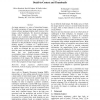Free Online Productivity Tools
i2Speak
i2Symbol
i2OCR
iTex2Img
iWeb2Print
iWeb2Shot
i2Type
iPdf2Split
iPdf2Merge
i2Bopomofo
i2Arabic
i2Style
i2Image
i2PDF
iLatex2Rtf
Sci2ools
89
Voted
GRAPHICSINTERFACE
2001
2001
Interacting with Image Sequences: Detail-in-Context and Thumbnails
An image sequence is a series of interrelated images. To enable navigation of large image sequences, many current software packages display small versions of the images, called thumbnails. We observed radiologists during typical diagnosis sessions, where image sequences are examined using photographic films and sophisticated light screens. Based on these observations and on previous research, we have developed a new alternative to the presentation of image sequences on a desktop monitor, a variation of a detail-in-context technique. This paper describes a controlled experiment in which we examined the way users interact with detail-in-context and thumbnail techniques. Our results show that our detail-in-context technique accommodates many individual strategies whereas the thumbnail technique strongly encourages sequential examination of the images. Our findings can assist in the design and development of interactive systems that involve the navigation of large image sequences.
Detail-in-context Technique | GRAPHICSINTERFACE 2001 | GRAPHICSINTERFACE 2007 | Image Sequences | Large Image Sequences |
| Added | 31 Oct 2010 |
| Updated | 31 Oct 2010 |
| Type | Conference |
| Year | 2001 |
| Where | GRAPHICSINTERFACE |
| Authors | Oliver Kuederle, Kori Inkpen, M. Stella Atkins, M. Sheelagh T. Carpendale |
Comments (0)

